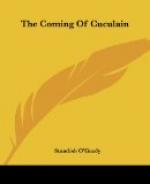Setanta was awaked by the loud singing of the birds. Light of heart the boy started from his mossy couch and wondered at that tuneful chorus. The dawning day trembled through the trees still half-bare, for it was the month of May.
“Horses have been here in the night,” said the boy, “one horse. What mighty hoof marks!” He wondered the more seeing how the marks encircled him. “I too will one day have a chariot and horses, and a deft charioteer.” He stood musing, “Is it the grey of Macha? [Footnote: The goddess Macha, already referred to, had a horse which was called the Grey of Macha—Liath-Macha. He was said to be still alive dwelling invisibly in Erin.] They say that he haunts this mountain.” He hastened to the brook, and finding a deep pool, bathed in the clear pure water and dried himself in his woollen bratta [Footnote: The Gaelic word for mantle.] of divers colours. Very happy and joyous was Setanta that day. And he spread out the bratta to dry, and put on his shirt of fine linen and his woollen tunic that reached to the knees in many plaits. Shoes he had none; bare and naked were his swift feet.
“This is the mountain of Fuad the son of Brogan,” [Footnote: An ancient Milesian hero. Brogan was uncle of Milesius.] said he. “I would I knew where lies his cairn in this great forest that I might pay my stone-tribute to the hero.” Soon he found it and laid his stone upon the heap. He climbed to the hill’s brow and looked westward and saw far away the white shining duns of the marvellous city from which, even now, the morning smoke went up into the windless air. He trembled, and rejoiced, and wept. He stood a long time there gazing at Emain Macha. Descending, he struck again the great road, but he went slowly; he cast not his javelins and drave not his ball. Again, from a rising ground he saw Emain Macha, this time near at hand. He remained there a long time filled with awe and fear. He covered his head with his mantle and wept aloud, and said he would return to Dun Dalgan, that he dared not set unworthy feet in that holy place.
Then he heard the cheerful voices of the boys as they brake from the royal palace and ran down the wide smooth lawn to the hurling-ground. His heart yearned for their companionship, yet he feared greatly, and his mind misgave him as to the manner in which they would receive him. He longed to go to them and say, “I am little Setanta, and my uncle is the king, and I would be your friend and playfellow.” Hope and love and fear confused his mind. Yet it came to him that he was urged forwards, by whom he knew not. Reluctantly, with many pausings, he drew nigh to the players and stood solitary on the edge of the lawn southwards, for the company that held that barrier were the weaker. He hoped that some one would call to him and welcome him, but none called or welcomed. Silently the child wept, and the front of his mantle was steeped in his tears. Some looked at him, but with looks of cold surprise,




